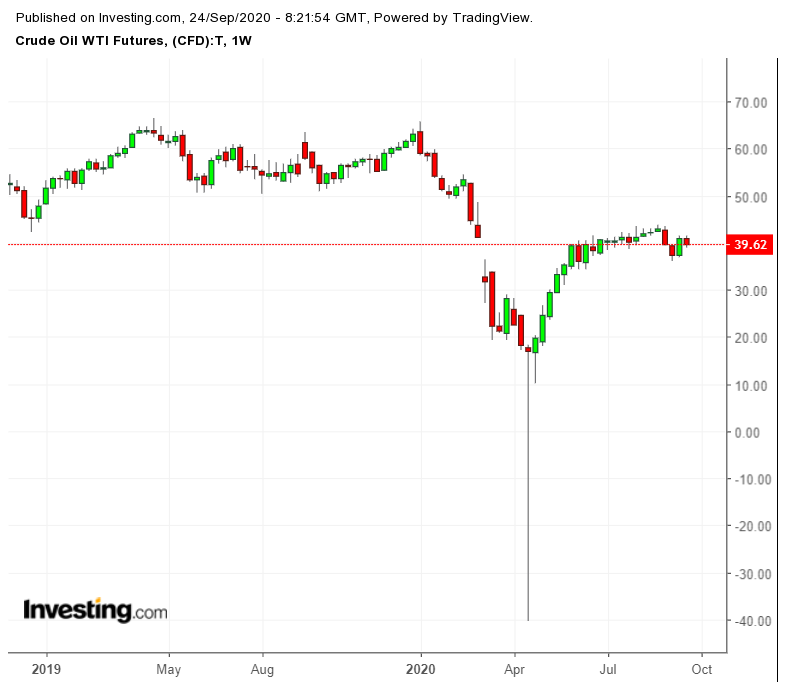U.S. policy impacts the price of oil tremendously—in terms of both supply and demand.
The reason: pre-coronavirus, the United States was the world’s largest producer and consumer of oil. U.S. foreign policy decisions also impact the production and trade of foreign oil.

Given this significant influence over the oil market, it's important for traders to keep abreast of how the U.S. presidential election could affect the commodity's production and prices. The upcoming election is scheduled for Nov 3, and the first debate between President Trump and Vice President Biden is set for Tuesday, Sept. 29.
If Trump is reelected, it is expected that the federal government will continue with the same policies regarding U.S. domestic oil and gas production. On the other hand, if Biden becomes president, federal policies towards oil and gas production are likely to change, but it’s not entirely clear how.
Oil Policy: Biden Vs. Trump
When it comes to energy policy plans, Biden has not been consistent. At times saying he wants to end the use of fossil fuels and implement the Green New Deal, and at other times he's stated that he would absolutely not ban fracking.
We will know more if and when Biden clarifies his position, but even then it will be complicated because statements candidates make during a campaign do not always reflect the way they behave in office. For example, President George W. Bush was an oilman and thought to be a friend to the oil industry, but it was under Obama, a leader known as an environmentalist, that the oil and gas industry in the U.S. really prospered.
In future columns before election day, I will address possibilities for U.S. oil and gas production (and demand) depending on which candidate wins.
If President Trump wins a second term, traders could expect U.S. foreign policy to continue along its current path. Sanctions preventing oil and gas exports from Iran and Venezuela could continue or ramp up. Biden, alternatively, would enact a different foreign policy in this respect. He has said he would implement a drastically different policy towards Iran, however, it is unclear if that would include relaxing sanctions on Iran’s oil.
According to Platts, in August Iran produced 1.95 mbpd. Iran would likely see a Biden win as a reason to put more oil on the market, clandestinely or freely. China would probably also purchase more oil from Iran, at the very least through the same backchannels as it furtively bought Iranian oil in contravention of sanctions in the past. If sanctions are relaxed, Iran’s other customers, India and Korea, would probably resume purchases of oil and gas, but traders shouldn’t look for European firms to enter the Iranian oil scene just yet. Iran is still not a promising business environment for them.
If Iran boosts its production and sales during a Biden administration, OPEC policy would be impacted. Such a situation could potentially destabilize the OPEC+ agreement if Iran demands special consideration to over-produce its quota due to the economic hardship that U.S. sanctions have had on the country. If Iranian oil is added to the market before the current low-demand period significantly improves, we would see even lower oil prices. However, Iran’s production recovery would take some time, so it seems reasonable to assume that we would see significant demand recovery before it could produce 3.5 or 4 mbpd.
A Biden win could also see U.S. sanctions on Venezuelan oil lifted. However, the Venezuelan oil market is in such poor shape that the country would probably not be able to export any oil for some time. Venezuela has also seen a large portion of its talent in the industry flee the country over the last few years, which would further complicate efforts to increase production.
In fact, we would probably see more Iranian exports of crude oil and gasoline heading towards Venezuela until the Venezuelan industry gets back on its feet. Venezuela would likely see an influx of Russian, and possibly Chinese, investment and personnel to jump-start its industry. Even in an oversupplied market, because Venezuela primarily produces heavy oil, it would be in high demand if it returned to the market, even in the U.S. So, despite the significant barriers (loss of talent, expense, government corruption, infrastructure degradation) Venezuela would likely attract interested parties to rehabilitate the industry and purchase its oil.
Other U.S. political news from California has the oil market's attention this week. California Governor Gavin Newsom signed an executive order mandating that would prohibit the sale of internal combustion engine cars in his state by 2035. California is the largest state in the U.S. with about 40 million people, but this is not as big of a deal as it seems since Newsom probably lacks the authority to do this, and it can be overturned easily by a future governor between now and 2035.
Moreover, it is an impractical order because California’s electrical grid lacks the capacity to handle this. Though this order may be copied by other states, oil traders should not read too much into these state efforts unless or until the car manufacturers start responding to them with altered strategy.
